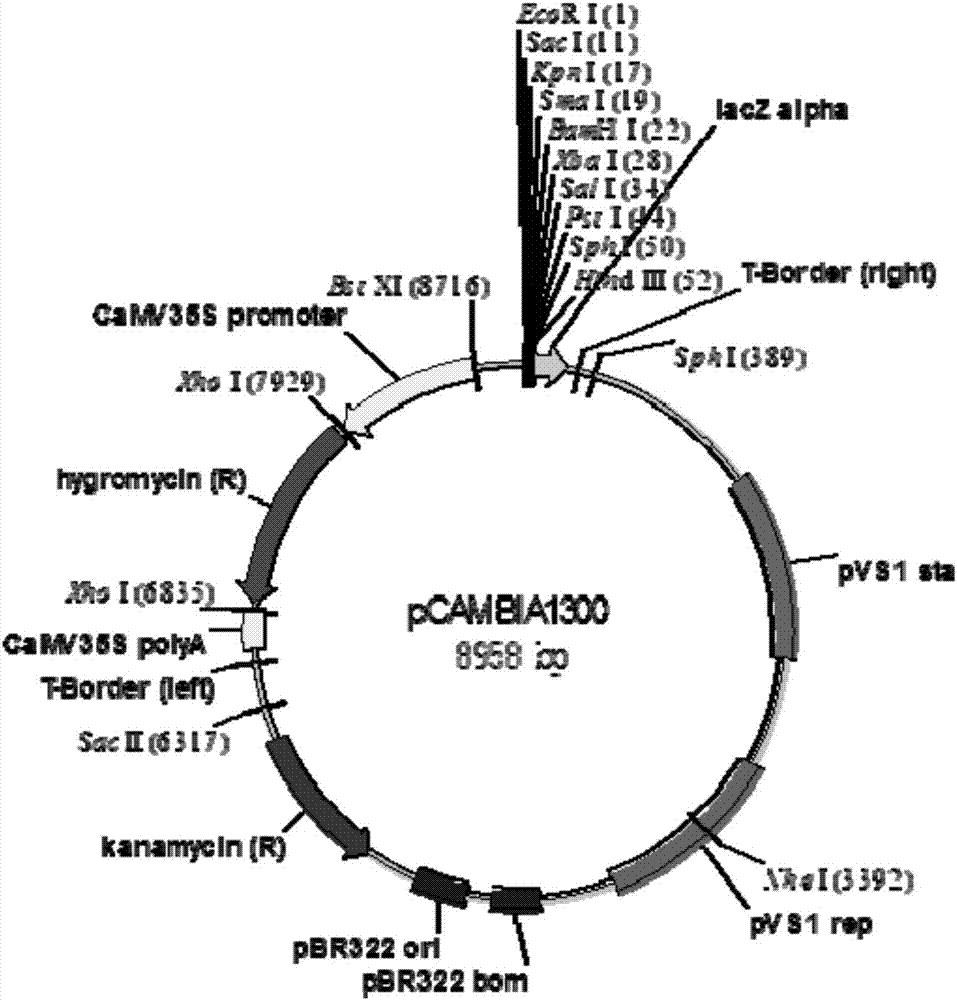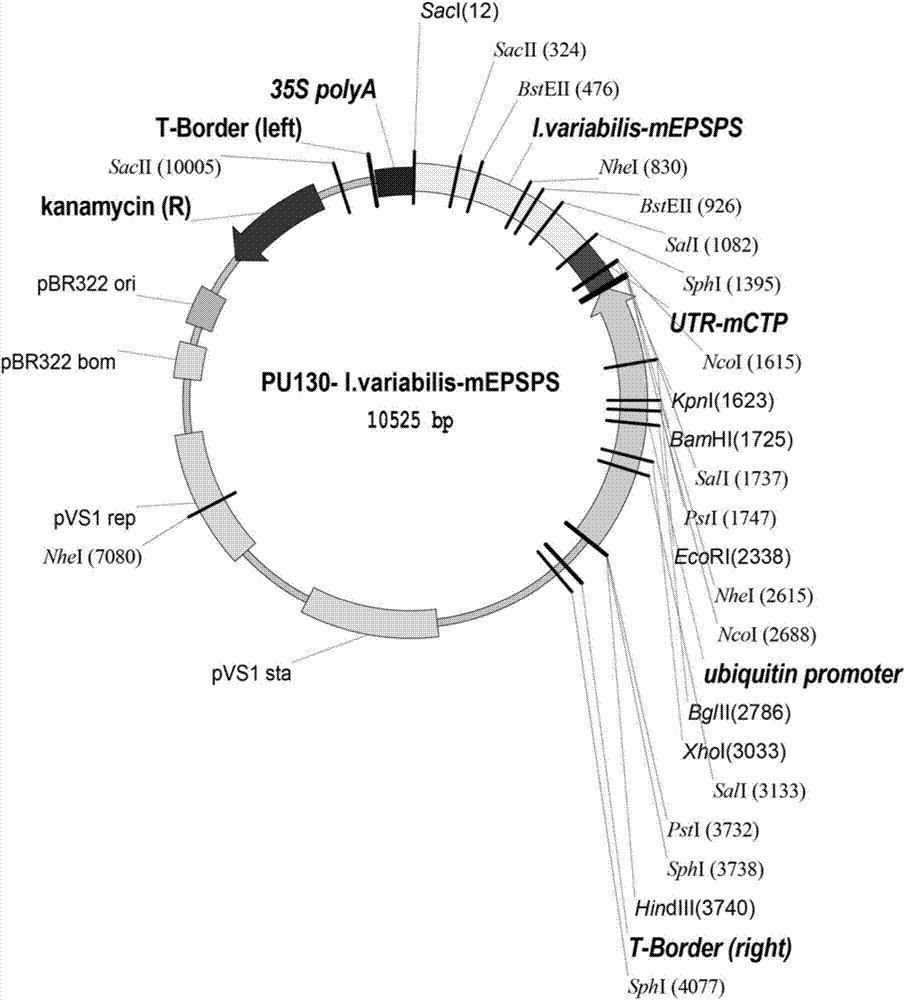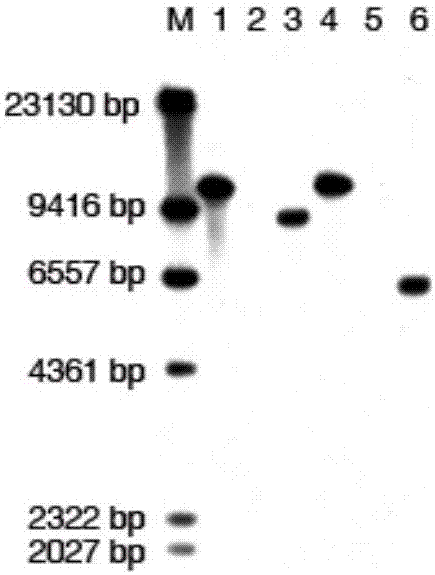Modified glyphosate-resistant gene and glyphosate-resistant rice cultivation method
A glyphosate-resistant and glyphosate-resistant technology, applied in genetic engineering, plant genetic improvement, botanical equipment and methods, etc., can solve the problems of low seed purity and low hybrid purity affecting rice yield and quality
- Summary
- Abstract
- Description
- Claims
- Application Information
AI Technical Summary
Problems solved by technology
Method used
Image
Examples
Embodiment 1
[0039] Example 1: Codon optimization of I. variabilis-EPSPS and CTP sequences
[0040] The original sequence of the target gene I.variabilis-mEPSPS used in the present invention was cloned from the microorganism, the bacteria Isoptericola variabilis, by the research group of Professor Liu Ziduo of Huazhong Agricultural University (the verification of gene function was also verified in microorganisms, and it was not in plants, especially not in said For verification in transformation, see literature: Yi S, et al.Characterization of a newtype of glyphosate-tolerant 5-enolpyruvyl shikimate-3-phosphate synthase from Isoptericolavariabilis.J Mol Catal B:Enzym.2015,111:1-8) , the original gene named I.variabilis-EPSPS, its nucleotide sequence is shown in SEQ ID NO: 17, the sequence of encoded amino acids is shown in SEQ ID NO: 18, and the usage frequency of different codons is shown in Table 1 . The analysis of the original I.variabilis-EPSPS gene and its application to the breedin...
Embodiment 2
[0046] Embodiment 2: Construction of plant expression vector
[0047] The original transformation vector used in the present invention is Agrobacterium Ti binary vector pCAMBIA1300 (provided by Australia pCAMBIA Laboratory, Center for the Application of Molecular Biology to International Agriculture). Digest pCAMBIA1300 ( figure 1 ), and then use T 4 DNA polymerase blunts the ends to form the intermediate vector p130. Then use HindⅢ+BamHI to double-enzyme cut p130 and connect it into the maize Ubiquitin promoter; further use BamHI+SacI to cut p130 into the sequence shown in SEQ ID NO:2 and SEQ ID NO:4 to form the final expression Vector PU130-I.variabilis-mEPSPS (see SEQ ID NO: 5 for the sequence, see figure 2 ). PU130-I.variabilis-mEPSPS was transformed into Agrobacterium EHA105, and the transformed Agrobacterium strain was stored at -70°C until use.
Embodiment 3
[0048] Example 3: Genetic transformation of rice Minghui 86 mediated by Agrobacterium
[0049] Callus induction and subculture mainly refer to the existing literature. The optimum concentration of glyphosate required for the selection of resistant callus of rice variety Minghui 86 (a conventional variety, the source of which is preserved by the State Key Laboratory of Crop Genetic Improvement, Huazhong Agricultural University) was determined to be 200 mg / L (agricultural For the steps of the bacillus-mediated transformation of Minghui 86, refer to the descriptions in 3.1-3.8).
[0050] 3.1 Callus induction
[0051] The mature rice Minghui 86 seeds were dehulled, then treated with 75% ethanol for 1 min, and 0.15% mercuric chloride seed surface was sterilized for 15 min; the seeds were washed 5 times with sterilized water; the seeds were placed on the callus induction medium (Add 2.5mg / L 2,4-D, 0.8g / L hydrolyzed casein, 0.6g / L proline, 0.5g / L glutamine, 30g / L maltose and 3g / L p...
PUM
 Login to View More
Login to View More Abstract
Description
Claims
Application Information
 Login to View More
Login to View More - R&D
- Intellectual Property
- Life Sciences
- Materials
- Tech Scout
- Unparalleled Data Quality
- Higher Quality Content
- 60% Fewer Hallucinations
Browse by: Latest US Patents, China's latest patents, Technical Efficacy Thesaurus, Application Domain, Technology Topic, Popular Technical Reports.
© 2025 PatSnap. All rights reserved.Legal|Privacy policy|Modern Slavery Act Transparency Statement|Sitemap|About US| Contact US: help@patsnap.com



